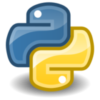This script is specific to operations moving from VMS to Linux, which requires migrating DCL scripts to Python scripts.
#!/bin/bash # processDCL.sh # Glenn Norman 2018 # Uncomment these two lines to prompt for a script name. # This script assumes the DCL script is a plain text file. # echo "Please specify a DCL script: " # read filename # Uncomment the line below to run in debug # (automatic file selection) mode. filename=DBMS_OOS_MEDICAID_RPT_POSTED.txt echo 1 # Remove unused head and tail material from a DCL script if [ -e $filename ]; then echo 2 # trim off the head matter awk '/CSESSION/,0' $filename > file1 echo 3 # trim off the trailing matter sed '/HALT/q' file1 > file2 echo 4 else echo "Please enter a valid file name." echo 5 fi echo 6 # get rid of $! sed s/\$\!//g file2 > file3 echo 7 # get rid of leading spaces sed -e 's/^[[:space:]]*//' file3 > file4 echo 8 # prefix every line sed -e 's/^/xx/' file4 > file5 echo 8.5 # split the lines sed -e 's/!/\n!/g' file5 > file6 echo 9 # correct the line order sed 'N;s/\(.*\)\n\(.*\)/\2\n\1/' file6 > file7 echo 10 # remove all spaces from the end of lines sed -i 's/[ \t]*$//' file7 echo 11 # turn all lines that start with a bang into expect lines sed s/!/child.expect\(\'/g file7 > file8 echo 12 # now add sendline to all lines that start with xx sed -e s/xx/child.sendline\(\'/g file8 > file9 echo 13 # add the ') suffix to each line sed s/$/\'\)/g file9 > file10 echo 15 # fix extra line returns tr -d '\015' < file10 > file11 # TODO: Transform first line to child = child.spawn ... # TODO: Add head material: shebang, include and any other # necessary lines. # TODO: Add cleanup routine to delete temp files. # TODO: Review output file for any further needed transformations. # TODO: Update final filename to original name + timestamp + .py.

